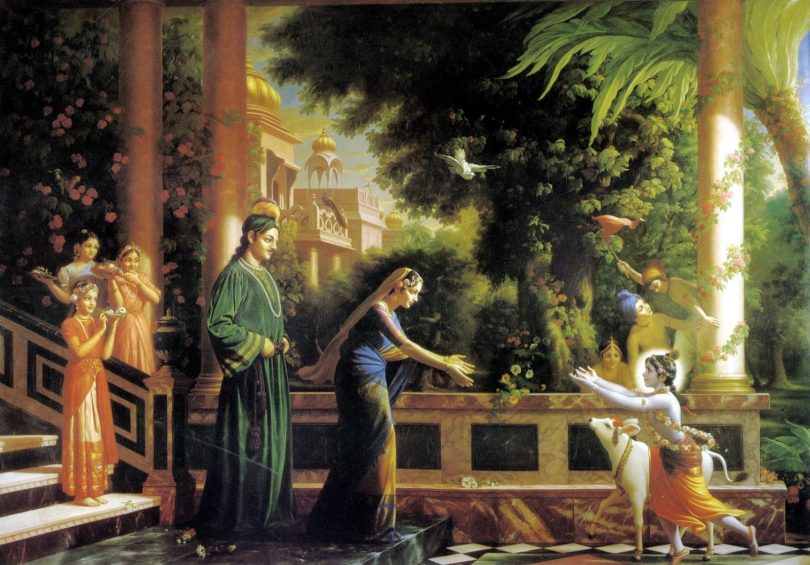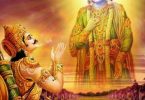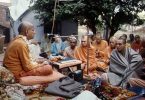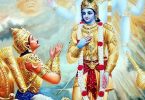Question: One of the seven secondary rasas is Bébhatsa-rasa ~ which is translated variously: disaster, ghastliness, disgust. Please explain how these emotions can be understood to be ecstatic love for Kåñëa, augmenting the primary prema-rasa.
Answer by Romapada Swami:
Ghastliness – Chapter 48, NOD
It is understood from authoritative sources that an attachment for Kåñëa because of feelings of disgust sometimes presents a ghastly ecstasy in devotional service. The person experiencing such ecstatic love for Kåñëa is almost always in the neutral stage of devotional service, or çänta-rasa.
In this mellow of devotional service in ghastliness, the sub–ecstatic symptoms are – spitting upon the consideration of one’s past life, contorting the face, covering the nose and washing the hands. There is also trembling of the body, forcible twisting of the body, and perspiration. Other symptoms which may be present are shame, exhaustion, madness, illusion, frustration, humility, self-pity, restlessness, eagerness and stunning of the body.
When a devotee, lamenting for his past abominable activities, shows special symptoms on his body, his feeling is called ecstasy in devotional service in ghastliness. This is caused by the awakening of his Kåñëa consciousness.
A fortunate child in the womb of his mother prayed to Kåñëa as follows: “O enemy of Kaàsa, I am suffering so much because of this material body. Now I am trapped within a mess of blood, urine and liquid stool, within the womb of my mother. Because I am living in such a condition, I am suffering great pangs. Therefore, O divine ocean of mercy, please be kind to me. I have no ability to engage in Your loving devotional service, but please save me!” There is a similar statement by a person fallen in a hellish condition of life. He addressed the Supreme Lord thus: “My dear Lord, Yamaräja has placed me in a situation which is full of filthy and obnoxious smells. There are so many insects and worms, surrounded by the stools left by different kinds of diseased persons. And after seeing this horrible scene, my eyes have become sore, and I am becoming nearly blind. I therefore pray, O my Lord, O deliverer from the hellish conditions of life. I have fallen into this hell, but I shall try to remember Your holy name always, and in this way I shall try to keep my body and soul together.” This is another instance of ecstatic love for Kåñëa in an abominable situation.
In conclusion, it may be stated that ecstatic love for Kåñëa in ghastliness appears during the development of dormant neutrality into developed affection.
Bébhatsa-rasa
BRS 172.
Now bébhatsa-rasa with affection for Kåñëa will be discussed.
Here is an example:
A woman who fails to relish the fragrance of the honey of your lotus feet becomes totally befooled, and thus she accepts as her husband or lover a living corpse covered with skin, whiskers, nails, head-hair and body-hair and filled with flesh, bones, blood, parasites, feces, mucus, bile and air. SB 10.60.45
Rukmiëé speaks.
- TLC “Hiraëyakaçipu experienced an exchange of the ghastly and devastating rasa.”
- A message was once sent to Kåñëa informing Him that after He had killed Kaàsa, one of Kaàsa’s demon friends had gone insane. This demon was foaming at the mouth, waving his arms and rolling on the ground. This demoniac demonstration is in relationship with Kåñëa in a ghastly humor. This mellow or flavor is one of the indirect relationships with Kåñëa. The first five kinds of relationships are called direct, and the other seven are called indirect. Some way or other, the demon must have had some relationship with Kåñëa, because these symptoms developed when he heard that Kåñëa had already killed Kaàsa. Çréla Rüpa Gosvämé remarks that there is also transcendental excellence in this kind of symptom.
- When Yaçodä saw that her dear baby Kåñëa was playing on the chest of the dead demoniac woman, mother Yaçodä, at a loss what to do, began to walk this way and that. This is an instance of being emotional on account of seeing something ghastly.
- Once the Bakäsura demon assumed the shape of a very big duck and opened his mouth in order to swallow Kåñëa and all the cowherd boys. When Kåñëa was entering into the demon’s mouth, Balaräma and the other cowherd boys almost fainted and appeared as though they had no life. Even if devotees are illusioned by some ghastly scene or by any accidental occurrence, they never forget Kåñëa.
- Sometimes ghastly activities also support strong ecstatic love for Kåñëa. This state of mind is called ecstatic fearfulness under illusion. In the Tenth Canto, Twenty-third Chapter, verse 40, of Çrémad-Bhägavatam, there is the following statement by the brähmaëas who were performing sacrifices: “We have all been born into three advantageous conditions: we are in high brähmaëa families, we have ceremoniously received the sacred thread, and we are also properly initiated by a spiritual master. But, alas, in spite of all these advantages, we are condemned. Even our observance of brahmacarya is condemned.” The brähmaëas thus began to condemn their own activities. They realized that in spite of being so elevated by birth, education and culture, they still were under the spell of the illusory energy. They also admitted that even great yogés who are not devotees of the Lord are covered by the influence of material energy.







